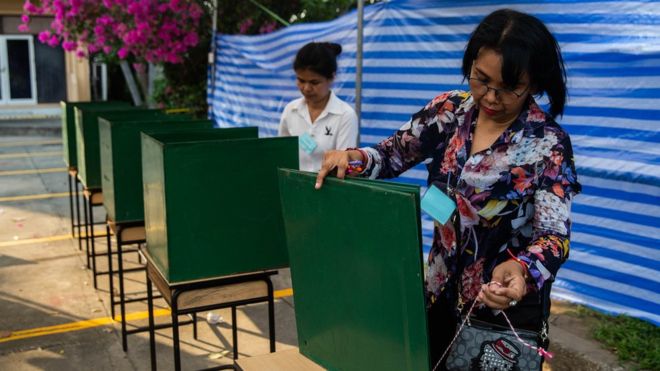A pro-military political party in Thailand has taken an unexpected lead in the country’s first election since the army took power five years ago.
With more than 90% of ballots counted, the Palang Pracha Rath Party has gained 7.6m of the popular vote – half a million more than opposition Pheu Thai.
Pheu Thai is linked to former PM Thaksin Shinawatra, whose loyalists have won every election since 2001.
The announcement of official results has been postponed until Monday.
However it is now looking likely that the Palang Pracha Rath Party (PPRP) will be in a position to form a government under the current leader, General Prayuth Chan-ocha, who led the coup that ousted Mr Thaksin’s sister, Yingluck Shinawatra, in 2014.
More than 50 million people were eligible to vote, but turnout was reportedly low for Thailand at just 64%.
Thailand has been buffeted by political instability for years. After seizing power in 2014, the army promised to restore order and democracy, but had repeatedly postponed this election.
What are the results so far?
Preliminary results show Pheu Thai (For Thais) has won the most seats in the lower house – 120 out of 350 being elected. A further 150 seats will be allocated under a complicated formula according to each party’s share of the national vote.
Because of the way the voting system has been restructured by the military government, Pheu Thai is unlikely to be able to form a government.
Pro-military parties also have an advantage in choosing the next prime minister, because the 250-seat military appointed senate is likely to back the PPRP candidate, Gen Prayuth Chan-ocha.
The surprisingly strong performance by the military’s own party has raised eyebrows in Thailand, where many had predicted it would come a poor third, says the BBC’s Jonathan Head in Bangkok.
By winning the largest share of the popular vote, the military party can make a strong case for forming the next government, our correspondent adds.
Other key developments:
- The Democrat Party, Thailand’s oldest political party, performed poorly, with leader Abhisit Vejjajiva, who was prime minister from 2008 to 2011, stepping down to “take responsibility”.
- The brand new Future Forward Party, led by billionaire Thanathorn Juangroongruangkit, did surprisingly well and could be Thailand’s third-biggest party.
What is the political background to the vote?
The election is seen primarily as a contest between pro-military parties and allies of Mr Thaksin.
He was ousted in a coup in 2006 and lives in self-imposed exile to avoid a conviction for abuse of power. But he still has a significant following, largely among rural and less affluent voters.
Gen Prayuth was nominated as the only prime ministerial candidate of the newly formed pro-military PPRP.
At the time of the coup, the military said it wanted to restore order and stability and prevent the street protests which have broken out repeatedly over the years.
But the junta has been accused of taking an authoritarian approach to power, strictly controlling the media and arbitrarily using laws like lese majeste – which prohibits any criticism of the military – to silence opponents.
What moves did the military make before the election?
It introduced a constitution – approved by a referendum – which its critics say was designed to ensure it remained central to Thai politics.
Under this, the 500 elected MPs in the lower house will vote for a prime minister along with the 250-seat senate, which is appointed by the military.
A candidate only needs half the votes plus one to win. So the military’s preferred candidate – Gen Prayuth – would in theory only need 126 lower house votes to take office. The governing party or coalition can also appoint a non-MP as prime minister.
The new constitution also imposes a limit on the number of seats any one party can take, regardless of the number of votes won, and any future government is constitutionally bound to follow the military’s 20-year plan for Thailand.
What is being said about the election on social media?
There’s scorn, suspicion and a lot of sarcasm on Thai social media right now.
Thai hashtags, roughly translated to “Election Commission exposed” and “cheating election” were widely trending on Thai Twitter.
Many highlighted what they said were inconsistencies between the voter turnout and the ballots cast in several constituencies while others made light of the situation.
An online petition calling for the “removal of the most corrupt polling committee in Thai history” has also reached more than 250,000 signatures.
How has the king been involved?
The royal family, which is revered in Thailand, does not publicly play a role in politics, but wields great influence.
On the eve of the election, Thailand’s King Maha Vajiralongkorn issued a statement urging “peace and order” during the voting process.
The statement, which was featured on national television on Saturday evening, urged voters to “support the good people” and prevent “bad people from… creating chaos”.
The king weighed in last month, after a shocking sequence of events when a pro-Thaksin party nominated Princess Ubolratana, his sister, as its candidate for prime minister.
The king issued a statement saying it was “inappropriate” for her to be a candidate and she was disqualified.
The close relationship between Thaksin and the princess was again highlighted recently when she attended Thaksin’s daughter’s wedding with one analyst saying it would have galvanised his opponents.
“They rallied around Prayuth, they closed ranks, they put their forces behind Prayuth because they saw that Prayuth and Palang Pracha Rath were the forces that could keep Thaksin at bay,” said Thitinan Pongsudhirak, politics professor at Chulalongkorn University.
